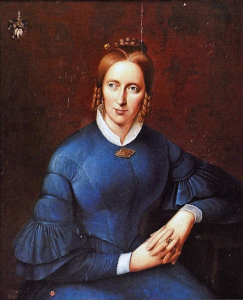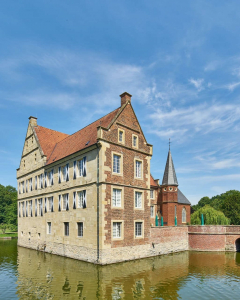Annette von Droste-Hülshoff
10 January 1797
Anna Elisabeth (called «Annette») von Droste-Hülshoff is born at Hülshoff Castle
Parents: Clemens August von Droste-Hülshoff (1760–1826) and Therese von Droste-Hülshoff, née von Haxthausen (1772–1853)
Siblings: Mana Anna (called «Jenny», 1795–1859), Werner (1798–1867), Ferdinand (1800–1829)
1804
First efforts in poetry writing as a seven-year-old.
1813/1814
Droste works on her tragedy «Bertha oder die Alpen» (Bertha or the Alps), which remains a fragment.
1826
Droste’s father dies, his eldest son Werner inherits Hülshoff Castle. Annette von Droste-Hülshoff, her mother and sister Jenny move to Haus Rüschhaus house, about 5 kilometres away.
1829
Droste’s brother Ferdinand dies.
Droste starts working on her novella «Die Judenbuche» (The Jew’s Beech).
1834
Her sister Jenny marries Joseph von Lassberg. The couple first moves to Switzerland and later on to Meersburg Castle at Lake Constance.
1838
Droste works on her cycle of poems «Klänge aus dem Orient» (Sounds from the Orient). The first edition of her poems is published semi-anonymously.
1840
Droste finishes her novella «Die Judenbuche» (The Jew’s Beech).
1841–1842
Stay with her sister at Meersburg Castle, where Dorste works intensively on poems.
1841
The cycle of poems «Die Elemente» (The Elements) is published in a magazine.
1842
«Die Judenbuche» (The Jew’s Beech) is published in a magazine in a series of 16 sequels.
1843–1844
Second stay at Meersburg Castle.
1844
The second edition of her poems is published.
1846
Third trip to Meersburg despite health issues.
24 May 1848
Annette von Droste-Hülshoff dies at Meersburg Castle. She leaves about 1,500 handwritten pages of text behind at Meersburg Castle – known today as her Meersburg Estate.
Annette von Droste-Hülshoff, portrait by Johann Sprick from 1838
Hülshoff Castle near the town of Havixbeck, Münster region
© Münsterland e.V. / Philip Fölting



